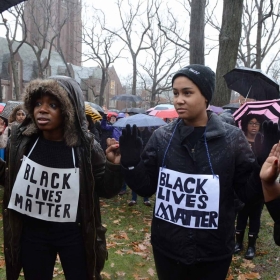The American conversation on race has grown more urgent all over the country in the past year—and this has been true at Wellesley, too. On Jan. 28, President H. Kim Bottomly wrote to the community, “Recent months have made it very clear that racial injustice remains a devastating force in our lives. … Though members of our community have supported each other during these recent difficult times, Wellesley is not immune. People of color and others from nondominant groups who live, study, and work here have suffered from racial injustice. Racism and ethnic bigotry are fundamental threats to institutions like Wellesley that are founded on the principles of equal opportunity and equal treatment.”
To understand and counter these injustices, and to more deeply educate the College community about the realities of the lives of people of color on campus, Bottomly has formed a Presidential Commission on Race, Ethnicity, and Equity at Wellesley to study the issues and make policy recommendations. Associate Professor of American Studies Michael Jeffries will chair a group comprising faculty, students, and staff, which will do its work over a minimum of three years.
The commission’s formation came after a series of meetings Bottomly held last winter, primarily with faculty of color. Jeffries feels the president “was trying to get a feel for the impact of the past few months, given the events going on around the country, student protests, and the Black Lives Matter movement. It’s a big step to name a presidential commission and to identify these issues in the way that Kim did. That puts a different sort of engine under the hood. We need to push back against institutional racism, both on and off campus. This is a long-term effort.”
Jeffries’ academic work as a sociologist focuses on race, gender, politics, identity, and popular culture. In 2013, Stanford University Press published his book, Paint the White House Black: Barack Obama and the Meaning of Race in America, which explores Obama-related topics to demonstrate how race relies on other social forces, like gender and class, for its meaning and impact. The College commission’s focus, he says, intersects with his teaching and research. “I have a certain set of skills and a certain kind of a knowledge base around these issues that can be helpful.”
Student life will be one focus of the commission’s exploration. “If you’re in college in America, you’re dealing with racism. You’re never going to go to a place that’s going to be a shield or a haven against issues of racism, sexism, and other forms of discrimination,” Jeffries says. “Those issues are going to come up. Do the students [at Wellesley] have the resources they need to build communities for themselves that are strong enough to push back against the racism that’s going on all around them, and make them feel as if they have a sense of efficacy on campus, that they’re a part of this place?”






We ask that those who engage in Wellesley magazine's online community act with honesty, integrity, and respect. (Remember the honor code, alums?) We reserve the right to remove comments by impersonators or comments that are not civil and relevant to the subject at hand. By posting here, you are permitting Wellesley magazine to edit and republish your comment in all media. Please remember that all posts are public.